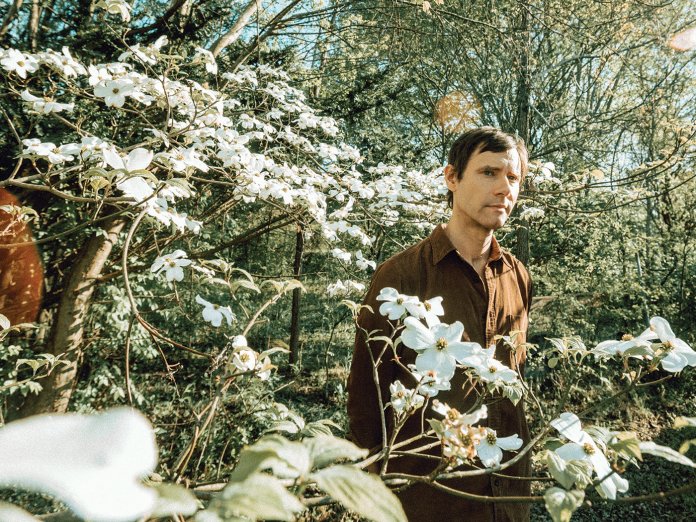Nathan Salsburg lives on an old tree farm just outside Louisville, Kentucky, with his partner Joan Shelley, their newborn baby daughter, a cat, a couple of goats and a barnful of old 78s and roots reggae 45s. He has a dream day job working for the Alan Lomax Archive and a burgeoning reputation as an intrepid folk guitarist, having released three solo albums and backed up the likes of Shelley, The Weather Station, Shirley Collins and Bonnie ‘Prince’ Billy. But there was still something missing.
Since forgoing the synagogue for the church of hardcore punk as a teenager, Salsburg felt he had lost touch with his essential Jewishness. And so, over the last few years, he has taken to leafing through a book of Hebrew psalms and turning them into brand new songs. It’s the kind of practice that would seem to satisfy his curatorial mindset, but unlike Salsburg’s two recent low-key Landwerk releases – which found him playing along to loops from that prodigious collection of 78s as a way of convening directly with the past – Psalms is a ‘proper’ album that marks the emergence of Salsburg as a singer-songwriter in his own right.
Certainly, Salsburg is more conscious than most of the shoulders on which he stands. On Psalms, he was keen to reference various styles of Jewish music, whether that be the folk music of Maghrebi Jews in North Africa or the happy-clappy “American nusach” played in the Jewish summer camps he attended as a kid. But these stimuli merge naturally with his usual folk, blues and post-rock influences, becoming something fresh and his own.
Where Landwerk was slow-moving, eerie and solemn, Psalms is cautiously rousing. Opener Psalm 157 begins with an organ drone, introducing a resonant acoustic guitar riff reminiscent of Saharan desert rock. Salsburg’s playing is bright and purposeful, capable of driving a song forward as well as filling in crucial detail. Singing mostly in Hebrew, his voice is low but not gruff, with Israeli singer-songwriter Noa Babayof providing harmonies but more often simply doubling the melody an octave higher. The aim was to remain faithful to the source material by shaping these psalm fragments into songs that listeners could play or sing along to themselves; Salsburg achieves this with simple and inviting refrains that avoid tweeness or banality.
In places, though, his ambitions are bolder. The beautiful Psalm 33 is freighted with yearning, even when singing phrases that, in the English translation provided, may struggle to engage secular listeners (“Sing gladly, O righteous, of the lord”). Salsburg’s evident passion for the project and his earnest mission to reconnect with his Jewish heritage provides the emotional trigger.
The overall effect is not unlike Sufjan Stevens’ Seven Swans, an album that drew heavily on the songwriter’s religious upbringing to say something about his relationship to the world in the here and now. On Psalms, it’s the arrangements – by close friend and regular collaborator James Elkington – that really elevate this album beyond the level of quaint personal project. A canopy of clarinet and strings lends the music a verdant, mystical quality, with Salsburg’s quizzical guitar figures often answered by a stirring burst of flugelhorn. Psalm 104 is swathed in descending piano chords and Hammond swirls, supporting a melody that nods to Lou Reed’s Perfect Day, itself a kind of urban hymn.
O You Who Sleep – based on a poem by the medieval Hebrew poet Judah Halevi – is the only song performed in English, but it provides enough lyrical fibre to give you a strong impression of Salsburg’s infectious, can-do worldview (“As birds shake off the dew of night when they wake/Like swallows soar/And free yourself of time/That seething sea”). It’s credit to his newfound confidence that it takes you a few lines to realise the elegant lead vocal is being sung by Salsburg himself and not actually Will Oldham, who adds a counter-melody midway through.
You might suspect that a quasi-conceptual venture such as this serves partly as a protective shield for its creator, to avoid the messy business of revealing too much of themselves. But actually the opposite feels true here. For a musician who has up until now released largely instrumental music or played sideman to others, Psalms finds Salsburg stepping up to the plate as a songwriter and delivering a rich, full-blooded experience. The words may be centuries old but his emotional commitment to these songs and the way they throb with meaning and urgency – even in a language that will be unfamiliar to most listeners – is mightily impressive.



